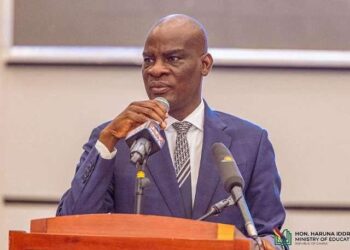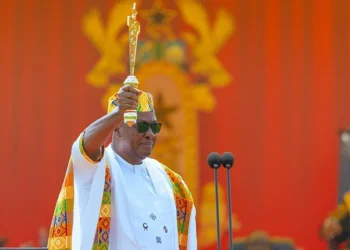The calls for a review of the 1992 Constitution have recently reached a fever pitch, with key national figures joining the chorus for a comprehensive review.
Among the latest voices is that of the Speaker of Parliament, Rt. Hon. Alban Sumana Kingsford Bagbin, who has thrown his weight behind growing calls for constitutional reform.
According to Bagbin, the current constitutional framework, while instrumental in stabilizing Ghana’s democracy, now requires fundamental revisions to reflect the country’s evolving political and socio-economic realities.
This call aligns with sentiments expressed by leading academics and civil society activists, including Professor H. Kwesi Prempeh, Executive Director of the Ghana Centre for Democratic Development (CDD-Ghana).
In a thought-provoking critique of the 1992 Constitution, Professor Prempeh argued that the Constitution has evolved into a tool for political elites to perpetuate a system of governance that benefits the few while keeping the majority disenfranchised.
Professor Prempeh’s remarks painted a stark picture of how successive governments have not only embraced but actively exploited the constitutional framework to advance self-serving agendas, much to the detriment of the nation’s development.
“They like to say it was written for one man. Meanwhile, the records of their respective tenure in office show that the successors of that one man love this constitution far more and have used it and exploited its gaps for more self-serving purposes and in more counter-developmental and other perverse ways than the man for whom it was supposedly written.
“In any case, that man for whom the constitution was supposedly written has been gone from office since January 2001. Why, then, does ‘his’ constitution persist, presumably to our collective detriment?”.
Professor H. Kwesi Premeph, Executive Director, Ghana Centre for Democratic Development (CDD-Ghana)
Excessive Powers of the Executive President
Professor Prempeh’s critique of the Constitution centred on the disproportionate power it grants to the office of the president, enabling both good and bad leaders to navigate the framework in ways that best suit their personal or political agendas.
While a capable and well-intentioned President can use the Constitution to enact meaningful reform and drive development, Professor Prempeh warned that the same document provides ample opportunities for a bad President to entrench poor governance.
“It grants and allows our Presidents far more power than a good president needs—and far more power than a bad president must have. In short, it does not hinder a good president from doing anything good that he or she desires to do for the country. On the other hand, a bad president will find in it all the gaps he could need to underwrite his bad governance.”
Professor H. Kwesi Premeph, Executive Director, Ghana Centre for Democratic Development (CDD-Ghana)
The Executive Director of the CDD-Ghana’s critique underscores a fundamental flaw in the 1992 Constitution, asserting that it is too reliant on the goodwill and integrity of the individual occupying the office of the President.
With this in mind, Professor Prempeh rejected the notion that the Constitution was written for one man. Instead, he argued that it was designed for anyone who holds the highest office in the land—a structure that has been exploited by every President since 1992, regardless of their party affiliation or public pronouncements.
The Political Class and the 1992 Constitution
Professor H. Kwesi Prempeh’s analysis deepened as he shifted focus to the political class and its relationship with the Constitution.
According to him, the Constitution is not a problem for the political elites; rather, it works in their favor, providing them with all the tools they need to govern effectively if they so wish.
“Whatever is bad about the 1992 Constitution is bad only from the perspective of the country and We the People. The political classes, however, have no similar complaint or excuse; the Constitution gives them all they want or need to run this country well if they are so inclined.”
rofessor H. Kwesi Premeph, Executive Director, Ghana Centre for Democratic Development (CDD-Ghana)
Herein lies the crux of the problem: the political elite have no incentive to initiate reforms because the Constitution protects their interests.
Professor Prempeh emphasized that, under the current constitutional arrangement, it is politicians—those who benefit most from the system—who serve as gatekeepers of any proposed amendments.

Meanwhile, ordinary citizens, who bear the brunt of bad governance, have no legal power to initiate changes. This structural imbalance, Professor Prempeh noted, entrenches the power of the political elite while leaving citizens marginalized in the decision-making process.
“We the People have no legal power under this Constitution to initiate or trigger changes or amendments. The elite drafters of the Constitution reserved that gatekeeping role for their class allies”.
Professor H. Kwesi Premeph, Executive Director, Ghana Centre for Democratic Development (CDD-Ghana)
He lamented that despite 32 years of democratic rule under this Constitution, Ghana has not seen significant efforts to amend or revise the framework.
Professor Prempeh pointed out that both the New Patriotic Party (NPP) and the National Democratic Congress (NDC) have alternated power over eight-year cycles since 1992, yet neither faction has made meaningful strides toward constitutional reform.
“If they believed the Constitution was counter-developmental and wanted better for this country, they could have given us a more fit-for-purpose Constitution by now,” he remarked.
The reason, Professor Prempeh asserted, is that both parties and their establishment allies are comfortable with the current system, which allows them to govern in ways that may not always align with the public interest.
The Executive Director of the Centre for Democratic Development (CDD-Ghana), Professor H. Kwesi Prempeh sobering conclusion is that Ghana’s Constitution, in both its practice and interpretation, has become an “elite/insider conspiracy against the people.“
This is a damning indictment of how the Constitution has been co-opted by political insiders to preserve their power and influence, while ordinary Ghanaians are left holding the “short end of the stick.”
However, Professor Prempeh is quick to note that the citizens themselves are not entirely blameless. He argued that Ghanaians have become complicit in their own oppression by accepting the status quo without challenging the system.
“We, too, have become complicit in our own oppression, if only by our passive and docile acceptance of the status quo,” he wrote.
Professor Prempeh’s critique is a call to action for Ghanaians to demand a more citizen-friendly Constitution, one that empowers the people rather than serves the interests of the political elite.
He advocated for a constitutional framework that would curb the excessive powers of the presidency, close the gaps that allow for political exploitation, and give ordinary citizens a voice in shaping the laws that govern their country.
As the country reflects on three decades of governance under the 1992 Constitution, Professor Prempeh’s words serve as a timely reminder that meaningful change will only come when Ghanaians, as a collective, demand a system that truly reflects their aspirations for good governance and national development.
Until then, the political elite will continue to hold the upper hand, exploiting a Constitution that shields them from accountability while leaving the people with the “short end of the stick”, as Professor H. Kwesi Prempeh earlier intimated.
READ ALSO: Celebrating Dr. Kwame Nkrumah: His Impact on Highlife Music in Ghana























